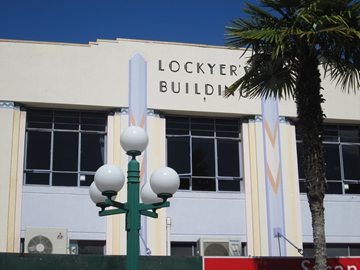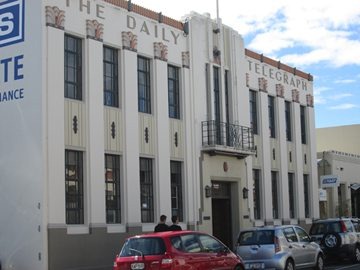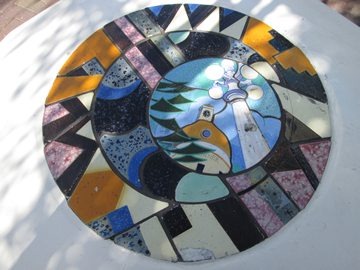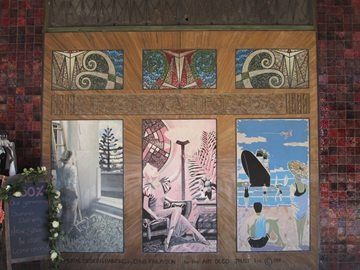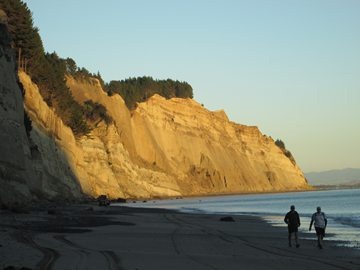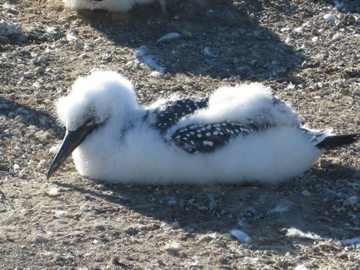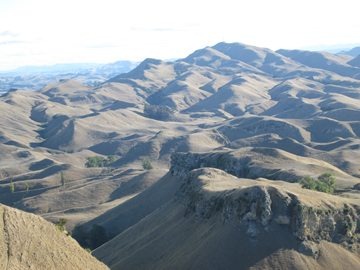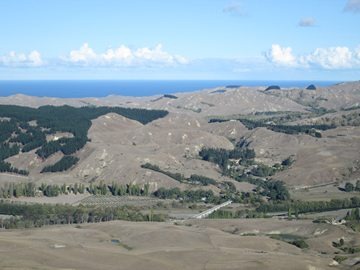Tuesday 7th May - Starting our Cook's Tour of New Zealand

|
Tuesday 7th May – North Island Once Arnamentia was back in the water we spent a week back in Whangarei Town Basin doin’ a bit more boat stuff before we embarked upon what we felt to be a well earned holiday. Whilst the Town Basin is extremely convenient – town centre and all its joys a couple of hundred yards away - the water is very dirty, fed as it is by a river full of vegetation from the surrounding forests. So, before hitting the road we took Arnamentia down to the cleaner water of Marsden Cove Marina at the entrance to Whangarei Harbour. It’s a couple of hours by water, around 45 minutes by car and is surrounded by absolutely nothing very useful or picturesque. Neither will it be until the grandiose plans for the creation of a major yachting centre there are revived – unlikely until the current global financial hiccup has been overcome. Amazing infrastructure – roads, street lights and all that but no buildings. The marina (very modern and reasonably swept up from a pontoon point of view) sports a decent café, liquor store, estate agent and hairdresser plus the usual (and very tidy) showers/loos and launderette. That’s all very lovely but it has a very poor excuse for a chandlery and no general store. So, you can’t buy food or anything else very useful in the marina. It all seems a little daft given that the nearest village/town is 4 or 5 miles away. Surely someone could open a corner shop and make a bomb at the same time as making the marina much more attractive? Oh, and a local minibus service. Eventually, on 19th March, the car was packed up and we set off. We made the decision to stay in Backpacker hostels whilst we were touring around – our friends Brad and Gloria on “Kindred Spirit” had done so and were kind enough to send us a list of good ones and ones to avoid. Whilst we saved money that way (the NZ dollar is very strong at the moment and since our arrival Sterling has continued to bomb – well done George) the unexpected bonus was meeting a great variety of people in the communal kitchens and ‘lounges’. We chatted with many Germans, a handful of French, some Scandinavians, a Chinese girl who was fed up with corporate life in Shanghai and, most remarkably, a couple of Jewish Indians speaking Hebrew. Most of the hostels we stayed in were fine from the accommodation point of view and had comfortable double rooms available. Oddly enough we never felt tempted to save a few more pennies by opting for the shared bunk rooms! Having stayed in around 15 establishments we came across a couple of duds and three or four were exceptionally comfortable. Key to getting an extra Dutton star were en-suite shower/loo, bedside lights and sharp knives in the kitchen! After a quick dash into Auckland to order charts at Boat Books our first night was spent miles off the beaten track in a log cabin belonging to a small farm overlooking the Waikato valley – it couldn’t have been more of a contrast from the sprawl that is Auckland.
Shekinah Farmland above the Waikato River A couple of days later we spent a pleasant few hours wandering around Napier on Hawkes Bay on the east coast of the North Island, a city that had been devastated by an earthquake in the 1930s. That was at the height of the Art Deco period and most of the re-building was done in that style. Sadly the shop fronts at ground level are all modern which rather spoils the impact now and makes photography quite a challenge as you can see below left.
Neither the Daily Telegraph nor the Tobacco Co building is used for its original purpose – the latter is now admin offices for a furniture store.
Some rather colourful street art of the period – shame about the ill positioned blackboard! We journeyed down the east coast of North Island aiming for Hawkes Bay where we had been invited to stay for a few days with Sue Speedy in Havelock North. We’d first met Sue, an old friend of Mike and Poey Vacher, when they all came aboard Arnamentia for a weekend some years ago. She and Ewen live in a lovely house overlooking a most impressive vineyard with numerous surrounding wineries. Whilst there we got up very early one morning in order to catch the tide – we were going to a gannet colony at Cape Kidnappers – by tractor and trailer. When the tide is high, it’s impossible to get there along the beach and there is no road or other route in – unless you’re a gannet. The cliffs on the way show marvellous variations in strata and many fault lines caused by moving plates (John Prescott, take note) are clearly visible. Gannets do seem to have a pretty tough approach to bringing up their young. When they are about 16 weeks old, they undertake their first flight – and it’s a long one – to Australia, where those who make it (20% we think) stay for around four years before coming back to breed. Having done that they never return to Oz. Except when coming ashore to breed, they apparently stay at sea until dying at up to 30 years old. At least that’s what the man driving the 1948 vintage petrol-driven tractor said – I think.
Cliffs catching the dawn sun Cape Kidnappers gannet Colony
Aah…… How cute! A few weeks, chum, and you’ll be airborne for Oz with about a 20% chance of making it. New Zealand has been suffering its worst drought for over 70 years. This has put a great strain on farmers who have had to dry off dairy cattle and dispose of stock early. And, there will not be much hay to feed over the winter. Farmers in NZ don’t receive any subsidy (unlike EU competitors) which is one of the reasons why the price of dairy produce here is so high. However, the fact that a drought has been declared releases some government financial assistance to farmers. We couldn’t fail to note how brown everywhere was but the scale of it was particularly noticeable when Sue Speedy took us up Te Mata; an imposing peak not far from her house, reached by a narrow Alpine-like zig zag road – not for faint hearted drivers.
Views from Te Mata – more like Africa than prime New Zealand sheep country It was sad to say goodbye to Sue and Ewen; they had shown us great hospitality and we are now much wiser about many aspects of New Zealand’s politics and economy. Whilst we we’ve been in NZ, the government has announced the sale of the state power company “Mighty River”. One of the arguments they’ve used is that UK, having privatised its power supply, now has lower prices. Well, all you folks at home, now you know for sure that you’re on the pig’s back. After a visit to Wellington to find out more about getting visas for Papua New Guinea and Indonesia (not straightforward, of course) we embarked upon the ferry for the South Island. We’ll blog separately about that adventure. |

